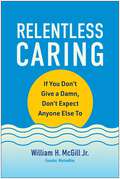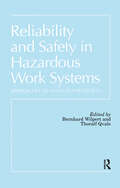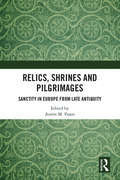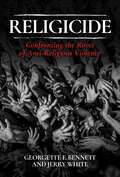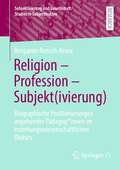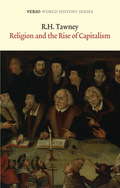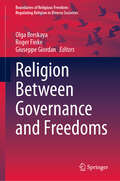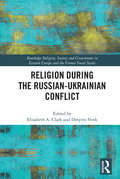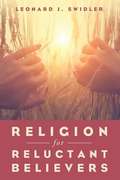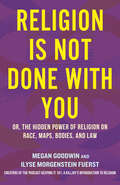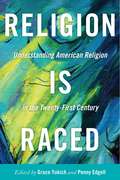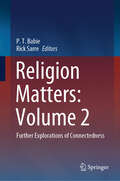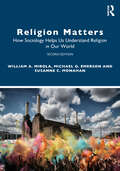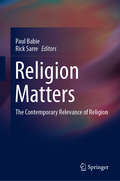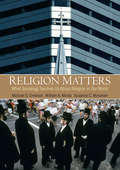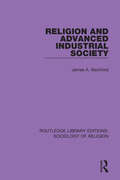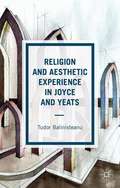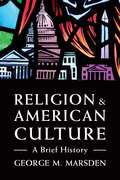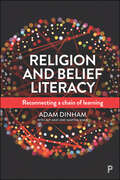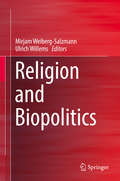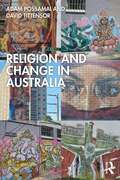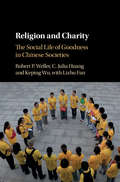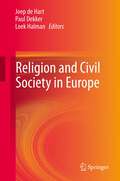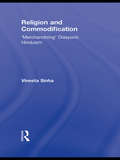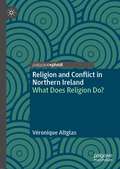- Table View
- List View
Relentless Caring: If You Don't Give a Damn, Don't Expect Anyone Else To
by William H. McGillBy delivering kindness every day at all levels of your organization and to all your customers, you will earn dedicated employees and repeat customers—and, ultimately, profitability. This step-by-step guide details an approach to leadership focused on caring about the well-being of others. As founder and executive chairman of MarineMax and with kindness as his True North, William H. McGill Jr. helped transform the company from a small disparate group of boat dealers into a highly profitable $2 billion global conglomerate. In Relentless Caring, McGill shares what he&’s learned about how to truly care about others 24/7 and generate solid profits at the same time. Readers will learn: Why having the right people in the right jobs matters How to find the right team members and take care of them and their families, including providing high-quality, low-cost health care Why long-term thinking is essential for success Why persistence, consistency, and risk are essential for growth Why investing in basic tools like personality profiling and a structured hiring and promotions system contribute to making the right decisions Relentless Caring is a practical playbook for &“managing from the heart&”—tirelessly delivering goodness and kindness to your team members and to customers to build strong loyalties that can buoy your organization even in the most challenging economic waters.
Reliability and Safety In Hazardous Work Systems: Approaches To Analysis And Design
by Bernhard Wilpert Thoralf QvaleThis volume contains a selection of original contributions from internationally reputed scholars in the field of risk management in socio?technical systems with high hazard potential. Its first major section addresses fundamental psychological and socio?technical concepts in the field of risk perception, risk management and learning systems for safety improvement. The second section deals with the variety of procedures for system safety analysis. It covers strategies of analyzing automation problems and of safety culture as well as the analysis of social dynamics in field settings and of field experiments. Its third part then illustrates the utilization of basic concepts and analytic approaches by way of case studies of designing man?machine systems and in various industrial sectors such as intensive care wards, aviation, offfshore oil drilling and chemical industry. In linking basic theoretical conceptual notions and analytic strategies to detailed case studies in the area of hazardous work organizations the volume differs from and complements more theoretical works such as Human Error (J. Reason, 1990) and more general approaches such as New Technologies and Human Error (J. Rasmussen, K. Duncan, J. Leplat, Eds.)
Relics, Shrines and Pilgrimages: Sanctity in Europe from Late Antiquity
by Antón M. PazosSince Late Antiquity, relics have provided a privileged spiritual bond between life and death, between human beings and divinity. Royalty, nobility and clergy all tried to obtain the most prestigious remains of sacred bodies, since they granted influence and fame and allowed the cult around them to be used as a means of sacralization, power and propaganda. This volume traces the development of the veneration of relics in Europe and how these objects were often catalysts for the establishment of major pilgrimage sites that are still in use today. The book features an international panel of contributors taking a wide-ranging look at relic worship across Europe, from Late Antiquity until the present day. They begin with a focus on the role of relics in Jacobean pilgrimage, before looking at the link between relics and their shrines more generally. The book then focuses in on two major issues in the study of relics, the stealing of relics (Furta Sacra) and their modern-day scientific examination and authentication. These topics demonstrate not only symbolic importance of relics, but also their role as physical historical objects in material religious expression. This is a fascinating collection, featuring the latest scholarship on relics and pilgrimage across Europe. It will, therefore, be of great interested to academics working in Pilgrimage, Religious History, Material Religion and Religious Studies as well as Anthropology, Archaeology, Art and Cultural Studies.
Religicide: Confronting the Roots of Anti-Religious Violence
by Jerry White Georgette F. BennettA brave and timely proposal to name, investigate, and ultimately stop a new crime–the mass murder of millions of people for their faith.eligion-related violence is the fastest spreading type of violence worldwide. Attacks on religious minorities follow a clear pattern and are preceded with early warning signs. Until now, such violence had no name, let alone a set of policies designed to identify and prevent it. A unique attempt to create a new moral and legal category alongside other forms of persecution and mass murder, Religicide explores the roots of atrocities such as the Armenian Genocide, the Holocaust, the Bosnian war, and other human rights catastrophes. The authors tap into their decades of activism, interreligious engagement, and people-to-people diplomacy to delve into a gripping examination of contemporary religicides: the Yazidis in Iraq, the Rohingya in Myanmar, Uyghur Muslims and Tibetan Buddhists in China, and the centuries-long efforts to wipe out Indigenous Americans. Yet, even in the face of these horrific atrocities, the authors resist despair. They amplify the voices of survivors and offer a blueprint for action, calling on government, business, civil society, and religious leaders to join in a global campaign to protect religious minorities.
Religion - Profession - Subjekt: Biographische Positionierungen angehender Pädagog*innen im erziehungswissenschaftlichen Diskurs (Subjektivierung und Gesellschaft/Studies in Subjectivation)
by Benjamin Rensch-KruseDie vorliegende qualitativ-empirische Studie untersucht religiöse Orientierungen von Student:innen der Erziehungswissenschaften und der Lehrämter. Sie geht der noch nicht erforschten Frage nach, wie angehende Pädagog:innen ihre Religiosität mit Wissensinhalten ihres Studiums biographisch vermitteln und inwiefern dabei Subjektivierungseffekte eine Rolle spielen. Anhand einer Verknüpfung von Biographie- und Diskursanalyse werden übergeordnete kollektive Wissensordnungen in den Blick genommen, die im Kontext religionsbezogener und professionalisierungsspezifischer Diskurse zirkulieren und deren Analyse Hinweise darauf gibt, wie sich Student:innen im Spannungsfeld diskursiver Ordnungsstrukturen positionieren. Solcherart gibt die Studie Einblicke in Prozesse, die als Subjektivierungs- bzw. Professionalisierungsmomente gelesen werden können
Religion And The Rise Of Capitalism
by R. H. TawneyIn one of the true classics of twentieth-century political economy, R. H. Tawney addresses the question of how religion has affected social and economic practices. He tracks the influence of religious thought on capitalist economy and ideology since the Middle Ages, shedding light on the question of why Christianity continues to exert a unique role in the marketplace. In so doing, the book offers an incisive analysis of the morals and mores of contemporary Western culture.Religion and the Rise of Capitalism is more pertinent now than ever, as today the dividing line between the spheres of religion and secular business is shifting, blending ethical considerations with the motivations of the marketplace. By examining the period that saw the transition from medieval to modern theories of social organization, Tawney clarifies the most pressing problems of the end of the century. In tough, muscular, richly varied prose, he tells an absorbing and meaningful story. And in his new introduction, which may well be a classic in its own right, Adam Seligman details Tawney's background and the current status of academic thought on these issues, and he provides a comparative analysis of Tawney with Max Weber that will at once delight and inform readers.From the Trade Paperback edition.
Religion Between Governance and Freedoms (Boundaries of Religious Freedom: Regulating Religion in Diverse Societies)
by Roger Finke Giuseppe Giordan Olga BreskayaThis edited volume proffers a sociological outlook on the challenges contemporary societies face when states attempt to govern religious and cultural diversity and still protect freedoms of and from religion claimed by individuals, communities, and institutions. The collection of chapters brings readers into both theoretical discussions and empirical research. It illustrates how the promise of religious freedom has become a burgeoning social issue at the center of struggles over equity, inclusion, and cohesion in both public institutions and everyday interactions. The book is divided into three parts: the state’s legal and political mechanisms governing religious freedom; the challenges of religious pluralism for public institutions and global communities; social perceptions of religious freedom as an indicator and criterion of human rights culture in society. An international group of authors provide reviews, case studies, and data-driven research for students, researchers and practitioners working in the sociology of religion.
Religion During the Russian Ukrainian Conflict (Routledge Religion, Society and Government in Eastern Europe and the Former Soviet States)
by Elizabeth A. Clark; Dmytro VovkThis book investigates how the military conflict between Russia and Ukraine has affected the religious situation in these countries. It considers threats to and violations of religious freedom, including those arising in annexed Crimea and in the eastern part of Ukraine, where fighting between Ukrainian government forces and separatist paramilitary groups backed and controlled by Russia is still going on, as well as in Russia and Ukraine more generally. It also assesses the impact of the conflict on church-state relations and national religion policy in each country and explores the role religion has played in the military conflict and the ideology surrounding it, focusing especially on the role of the Ukrainian and Russian Orthodox churches, as well as on the consequences for inter-church relations and dialogue.
Religion For Reluctant Believers
by Leonard J. SwidlerThis is a volume written for persons who live in the mental world of modernity--that is, in a world that cherishes (1) freedom as the core of being human; (2) critical-thinking reason as the arbiter of what to affirm or not; (3) history, process, and dynamism at the heart of human life and society; and (4) dialogue with those who think differently yet who sense that there is somehow more to life, to reality, than meets the eye: that there is a depth or spiritual dimension not captured in our everyday experiences, which is customarily called religion. <P><P>Religion for Reluctant Believers explores the meaning of life: its joys, problems, and terrors, its pluses and minuses. In short, it asks the question, do you want to buy into Religion with a capital r, into a particular religion, or into no religion at all?
Religion Is Not Done with You: Or, the Hidden Power of Religion on Race, Maps, Bodies, and Law
by Megan Goodwin Ilyse Morgenstein FuerstA smart, irreverent, and accessible guide to thinking more deeply about how religion permeates and shapes the world around us –and why you need to understand the work it's doingReligion lurks in the floorboards of our daily lives, whether we want it to or not. A departure from more traditional approaches to "Religion 101," Religion Is Not Done with You gives thought-provoking context to the basics of religious studies by challenging readers to consider the origins of their assumptions about religion and broaden their perspectives on what religion is and does.Religion scholars and Keeping It 101 podcast duo Ilyse Morgenstein Fuerst and Megan Goodwin offer their straightforward, plainspoken overviews of religious studies theory: that religion is what people do (not just beliefs or individual practices); that people are complicated and messy and constantly changing, which means religion is also complicated and messy and constantly changing; that religion shapes what choices you get to make. Choices like what you can learn in school; how your government works; what kind of options you have (or increasingly don&’t have) in caring for your own body.Sure, you have the choice to participate in religion or not. But how you make that choice builds on your entire personal history, your connection to communities and regions, and the systems that surround you. All of which have been shaped by religion.Religion is systems and structures and assumptions we didn&’t create or choose – and, to be honest, we might not even like or agree with. You can feel however you want to feel about religion, but religion is shaping your world whether you like it or not. And if you don&’t like how religion is shaping our world? This book might just be your first step in diagnosing the problems and agitating for positive change. Even if you are done with religion, religion is not done with you.
Religion Is Raced: Understanding American Religion in the Twenty-First Century (Washington Mews)
by Penny Edgell Grace YukichDemonstrates how race and power help to explain American religion in the twenty-first centuryWhen White people of faith act in a particular way, their motivations are almost always attributed to their religious orientation. Yet when religious people of color act in a particular way, their motivations are usually attributed to their racial positioning. Religion Is Raced makes the case that religion in America has generally been understood in ways that center White Christian experiences of religion, and argues that all religion must be acknowledged as a raced phenomenon. When we overlook the role race plays in religious belief and action, and how religion in turn spurs public and political action, we lose sight of a key way in which race influences religiously-based claims-making in the public sphere.With contributions exploring a variety of religious traditions, from Buddhism and Islam to Judaism and Protestantism, as well as pieces on atheists and humanists, Religion Is Raced brings discussions about the racialized nature of religion from the margins of scholarly and religious debate to the center. The volume offers a new model for thinking about religion that emphasizes how racial dynamics interact with religious identity, and how we can in turn better understand the roles religion—and Whiteness—play in politics and public life, especially in the United States. It includes clear recommendations for researchers, including pollsters, on how to better recognize moving forward that religion is a raced phenomenon.With contributions by Joseph O. Baker, Kelsy Burke, James Clark Davidson, Janine Giordano Drake, Ashley Garner, Edward Orozco Flores, Sikivu Hutchinson, Sarah Imhoff, Russell Jeung, John Jimenez, Jaime Kucinskas, Eric Mar, Gerardo Martí, Omar M. McRoberts, Besheer Mohamed, Dawne Moon, Jerry Z. Park, Z. Fareen Parvez, Theresa W. Tobin, and Rhys H. Williams.
Religion Matters: Further Explorations of Connectedness
by Rick Sarre P. T. BabieThis book constitutes the second volume of 'Religion Matters: The Contemporary Relevance of Religion' (Springer, 2020). Offering a fresh and much-needed perspective, it explores the role of religion in the modern, neo-liberal world. The book acclaims that 'religion' is a contextual and contested term, which is extensively discussed in the Introduction.Designed to be read selectively, this book allows readers to delve into topics and traditions of specific interest without the necessity of reading the entire volume. In contrast to volume 1, where contributors critically engaged with religion and various disciplines, this book poses a fundamental question: Can religion contribute to the discipline under consideration?Authors were selected based on their ability to address this question. Some chapters concluded that religion may offer very little to the discipline under consideration, highlighting the value of volume 1's critical stance on the place of religion incontemporary society. However, the project's overall aim remained somewhat unfulfilled, leading to the creation of this second volume.The primary omission from the first book was a comprehensive exploration of the sciences and health sciences, which this second volume aims to rectify. Furthermore, additional authors were chosen to investigate the nature of connectedness facilitated by religion, horizontally through membership within wider communities, societies, cultures, or religious traditions, and vertically by examining historical relationships within a particular faith tradition, culture, community, or society. This volume also broadens its focus to include non-Christian perspectives, Indigenous perspectives, and an increased representation of female contributors.
Religion Matters: How Sociology Helps Us Understand Religion in Our World
by Michael O. Emerson William A. Mirola Susanne C MonahanReligion Matters: How Sociology Helps Us Understand Religion in Our World focuses on religion’s interplay with broader society, introducing students to the basic questions, ideas, and methods with which sociologists have analyzed the relationship between religion and society. Since the first edition, religion as a social force has changed dramatically in its content and consequences for the world. In this new edition, the authors update the foundational lenses used to understand religion’s multiple roles in society, assess the impact of technology and social media on religion and faith, draw further reflection from contemporary studies of religion and gender, and add a new chapter examining the increasing amount of religious polarization in the United States and throughout the world. With new illustrations and connections that make this readable textbook more accessible and relevant for today’s student, the second edition of Religion Matters remains a perfect counterpart for introductory courses concerned with the sociological study of religion.
Religion Matters: The Contemporary Relevance of Religion
by Rick Sarre Paul BabieThis book draws together leaders in science, the health sciences, the humanities, and the social sciences to investigate the role of religion, its meaning and relevance, for their area of specialization. It provides a much-needed fresh perspective on the way in which religion operates within the modern, neo-liberal world. The book approaches the topic by way of a critical engagement between religion, broadly defined, and the individual disciplines in which each of the contributors is expert. Rather than simply taking the dogmatic position that religion offers something to every possible discipline, each of the chapters in this collection addresses the question: is there something that religion can offer to the discipline in question? That is the value of the book – it takes a truly critical stance on the place of religion in contemporary society.
Religion Matters: What Sociology Teaches Us About Religion In Our World
by William Mirola Susanne C MonahanReligion Matters: What Sociology Teaches Us About Religion in Our World is organized around the biggest questions that arrise in the field of sociology of religion.This is a new text for the sociology of religion course. Instead of surveying this field systematically, the text focuses on the major questions that generate the most discussion and debate in the sociology of religion field.
Religion and Advanced Industrial Society (Routledge Library Editions: Sociology of Religion #9)
by James A. BeckfordThis book, first published in 1989, demonstrates that sociologists have much to gain from a strengthening of the connections between general theories about the changing character of modern western societies and specific studies of religion. It combines an exegesis of sociological classics in the study of religion, and a history of their influence upon the subject’s development; a criticism of Talcott Parson’s attempt to synthesise classical viewpoints into a single theory of modernity; a discussion of post-Parsonian theories of religion’s declining importance; and an argument that some quasi-Marxist thinkers may offer fresh insights into the place of religion in capitalist societies.
Religion and Aesthetic Experience in Joyce and Yeats
by Tudor BalinisteanuThis monograph is based on archival research and close readings of James Joyce's and W. B. Yeats's poetics and political aesthetics. Georges Sorel's theory of social myth is used as a starting point for exploring the ways in which the experience of art, like that of social myth, can be seen as a form of religious experience. The theorisation of the experience of art as a form of religious experience illuminates the role of art in engendering social attitudes in opposition to economic materialism and capitalism. Based on these analyses, the arguments explore the ways in which a theory that defines the experience of art as a form of religious experience can help us to answer three questions of pressing interest for the contemporary moment: How can we read cultural texts to imagine forms of social belonging through which to challenge the isolation of economic materialism? How can we imagine cultural texts to create the collective relations necessary for social change in global capitalism? How can we define an ethics of satisfaction that does not relate to this capital modernity?
Religion and American Culture: A Brief History
by George MarsdenMarsden offers the kind of historically and religiously informed scholarship that has made him one of the nation’s most respected and decorated historians. Students in the classroom and history readers of all ages will benefit from engaging with the story Marsden tells.
Religion and Belief Literacy: Reconnecting a Chain of Learning
by Adam DinhamThis book presents a crisis of religion and belief literacy to which education at every level is challenged to respond. As understanding different religions, beliefs and influences becomes increasingly important, it fills a gap for a resource in bringing together the debates around religious literacy, from theoretical approaches to teaching and policy. This timely publication provides a clear pathway for engaging well with religion and belief diversity in public and shared settings.
Religion and Biopolitics
by Ulrich Willems Mirjam Weiberg-SalzmannGiven the profound moral-ethical controversies regarding the use of new biotechnologies in medical research and treatment, such as embryonic research and cloning, this book sheds new light on the role of religious organizations and actors in influencing the bio-political debates and decision-making processes. Further, it analyzes the ways in which religious traditions and actors formulate their bio-ethical positions and which rationales they use to validate their positions. The book offers a range of case studies on fourteen Western democracies, highlighting the bio-ethical and political debates over human stem cell research, therapeutic and reproductive cloning, and pre-implantation genetic diagnosis. The contributing authors illustrate the ways in which national political landscapes and actors from diverse and often fragmented moral communities with widely varying moral stances, premises and commitments formulate their bio-ethical positions and seek to influence political decisions.
Religion and Change in Australia
by Adam Possamai David TittensorThis timely book offers a panoramic overview of the enduring significance of religion in modern Australian society. Applying sociological perspectives and contemporary theories of religion in society, it challenges conventional assumptions around the extent of secularisation in Australia and instead argues that religious institutions, groups, and individuals have proved remarkably adaptable to social change and continue to play a major role in Australian life. In doing so, it explores how religion intersects with a wide range of other contemporary issues, including politics, race, migration, gender, and new media. Religion and Change in Australia explores Australia’s unique history regarding religion. Christianity was originally imported as a tool of social control to keep convicts, settlers, and Australian Aboriginal peoples in check. This had a profound impact on the social memory of the nation, and lingering resentment towards the "excessive" presence of religion continues to be felt today. Freedom of religion was enshrined in Section 116 of the Australian Constitution in 1901. Nevertheless, the White Australia Policy effectively prevented adherents of non-Christian faiths from migrating to Australia and the nation remained overwhelmingly Christian. However, after WWII, Australia, in common with other western societies, appears to have become increasingly secularised, as religious observance declined dramatically. However, Religion and Change in Australia employs a range of social theories to challenge this securalist view and argues that Australia is a post-secular society. The 2016 census revealed that over half of the population still identify as Christian. In politics, the socially conservative religious right has come to exert considerable influence on the ruling Liberal-National Coalition, particularly under John Howard and Scott Morrison. New technologies, such as the Internet and social media, have provided new avenues for religious expression and proselytisation whilst so-called "megachurches" have been built to cater to their increasing congregations. The adoption of multiculturalism and increased immigration from Asia has led to a religiously pluralist society, though this has often been controversial. In particular, the position of Islam in Australia has been the subject of fierce debate, and Islamophobic attitudes remain common. Atheism, non-belief, and alternative spiritualities have also become increasingly widespread, especially amongst the young. Religion and Change in Australia analyses these developments to offer new perspectives on religion and its continued relevance within Australian society. This book is therefore a vital resource for students, academics, and general readers seeking to understand contemporary debates surrounding religion and secularisation in Australia.
Religion and Charity: The Social Life of Goodness in Chinese Societies
by Robert P. Huang Weller C. Julia Keping Wu Lizhu FanFree markets alone do not work effectively to solve certain kinds of human problems, such as education, old age care, or disaster relief. Nor have markets ever been the sole solution to the psychological challenges of death, suffering, or injustice. Instead, we find a major role for the non-market institutions of society - the family, the state, and social institutions. The first in-depth anthropological study of charities in contemporary Chinese societies, this book focuses on the unique ways that religious groups have helped to solve the problems of social well-being. Using comparative case studies in China, Taiwan and Malaysia during the 1980s and onwards, it identifies new forms of religious philanthropy as well as new ideas of social 'good', including different forms of political merit-making, new forms of civic selfhood, and the rise of innovative social forms, including increased leadership by women. The book finally argues that the spread of these ideas is an incomplete process, with many alternative notions of goodness continuing to be influential.
Religion and Civil Society in Europe
by Paul Dekker Loek Halman Joep De HartReligion is back again in Europe after never having been gone. It is manifest in the revival of religious institutions and traditions in former communist countries, in political controversies about the relationship between the church(es) and the state and about the freedom of religion and the freedom to criticize religion, and in public unease about religious minorities. This book is about religion and civil society in Europe. It moves from general theoretical and normative approaches of this relationship, via the examination of national patterns of religion-state relations, to in-depth analyses of the impact of religion and secularization on the values, pro-social attitudes and civic engagement of individuals. It covers Europe from the Lutheran North to the Catholic South, and from the secularized West to the Orthodox East and Islamic South-East with comparative analyses and country studies, concluding with an overall Europe-USA comparison.
Religion and Commodification: 'Merchandizing' Diasporic Hinduism (Routledge Research in Religion, Media and Culture)
by Vineeta SinhaSustaining a Hindu universe at an everyday life level requires an extraordinary range of religious specialists and ritual paraphernalia. At the level of practice, devotional Hinduism is an embodied religion and grounded in a materiality, that makes the presence of specific physical objects (which when used in worship also carry immense ritual and symbolic load) an indispensable part of its religious practices. Traditionally, both services and objects required for worship were provided and produced by occupational communities. The almost sacred connection between caste groups and occupation/profession has been clearly severed in many diasporic locations, but importantly in India itself. As such, skills and expertise required for producing an array of physical objects in order to support Hindu worship have been taken over by clusters of individuals with no traditional, historical connection with caste-related knowledge. Both the transference and disconnect just noted have been crucial for the ultimate commodification of objects used in the act of Hindu worship, and the emergence of an analogous commercial industry as a result. These developments condense highly complex processes that need careful conceptual explication, a task that is exciting and carries enormous potential for theoretical reflections in key fields of study. Using the lens of ‘visuality’ and ‘materiality,’ Sinha offers insights into the everyday material religious lives of Hindus as they strive to sustain theistic, devotional Hinduism in diasporic locations--particularly Singapore, Malaysia, and Tamilnadu--where religious objects have become commodified.
Religion and Conflict in Northern Ireland: What Does Religion Do?
by Véronique AltglasNorthern Ireland presents a fundamental challenge for the sociology of religion – how do religious beliefs, attitudes and identities relate to practices, violence and conflict? In other words, what does religion do?These interrogations are at the core of this book. It is the first critical and comprehensive review of the ways in which the social sciences have interpreted religion’s significance in Northern Ireland. In particular, it examines the shortcomings of existing interpretations and, in turn, suggests alternative lines of thinking for more robust and compelling analyses of the role(s) religion might play in Northern Irish culture and politics.Through, and beyond, the case of Northern Ireland, the second objective of this book is to outline a critical agenda for the social study of religion, which has theoretical and methodological underpinnings. Finally, this work engages with epistemological issues which never have been addressed as such in the Northern Irish context: how do conflict settings affect the research undertaken on religion, when religion is an object of political and violent contentions? By analysing the scope for objective and critical thinking in such research context, this critical essay intends to contribute to a sociology of the sociology of religion.
